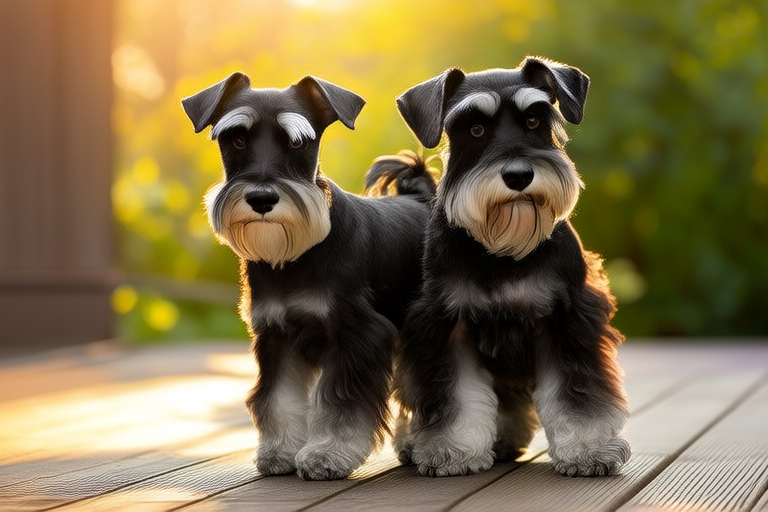Adorable Schnauzer Puppies: From Fluffy Babies to Loyal Companions
Welcome to the wonderful world of schnauzer puppies! These delightful bundles of fur are not just cute; they are intelligent, loyal, and full of personality. In this article, we’ll explore the journey of a schnauzer puppy from its fluffy infancy to becoming a devoted adult companion. We’ll cover their initial characteristics, training tips, health considerations, and the unique bond they form with their owners. Let’s dive into the charm of these remarkable dogs.
The Initial Characteristics of Schnauzer Puppies
Schnauzer puppies are born with soft, fluffy coats that give them a teddy bear-like appearance. Their small size and playful demeanor make them irresistible to anyone who crosses their path. The most common coat colors for schnauzer puppies are black, pepper and salt, and silver. Their signature mustache and beard add to their distinctiveness, making them stand out in any crowd.
At birth, schnauzer puppies are tiny, weighing around 0.5 to 1 pound. They grow rapidly during the first few months, reaching their full size by the time they are one year old. Their eyes, which are initially blue, gradually change to a striking brown as they mature. The puppies’ ears are floppy at first but will perk up as they grow older.
One of the most endearing traits of schnauzer puppies is their curiosity. They are always exploring their environment, sniffing every corner and investigating every new object they encounter. This natural curiosity can lead to some amusing moments, especially when they try to fit themselves into spaces too small for them.
Training Tips for Schnauzer Puppies
Training a schnauzer puppy is both a rewarding and challenging experience. These dogs are highly intelligent, which means they can learn quickly but also require consistent guidance to prevent bad habits. Positive reinforcement techniques, such as treats and praise, work best for schnauzer puppies. It’s essential to establish clear boundaries and rules early on to ensure they understand what is expected of them.
Housebreaking is one of the first challenges you’ll face when bringing home a schnauzer puppy. Consistency is key in establishing a routine for feeding, walking, and bathroom breaks. Crate training can be particularly effective, as it provides a safe space for the puppy and helps them learn to hold their bladder until the next potty break.
Socialization is another crucial aspect of raising a well-adjusted schnauzer puppy. Exposing them to various people, animals, and environments from an early age will help them become confident and friendly adults. Puppy classes are a great way to socialize your dog while teaching basic commands like sit, stay, come, and down.
Health Considerations for Schnauzer Puppies
While schnauzers are generally healthy dogs, they are prone to certain genetic conditions that owners should be aware of. Regular veterinary check-ups are essential to monitor their overall health and catch any issues early. Some common health concerns for schnauzers include:
- Allergies: Schnauzers may develop food or environmental allergies, which can cause skin irritation and other symptoms. A balanced diet and regular grooming can help manage these allergies.
- Dental Issues: Like many small breeds, schnauzers are susceptible to dental problems. Regular brushing and professional cleanings can prevent tooth decay and gum disease.
- Portosystemic Shunt: This condition affects blood flow to the liver and can lead to developmental issues if left untreated. Early diagnosis and treatment are critical for managing this condition.
Proper nutrition and exercise are vital for maintaining your schnauzer puppy’s health. High-quality dog food that meets their nutritional needs will support their growth and development. Regular exercise, including walks and playtime, will keep them physically fit and mentally stimulated.
The Unique Bond Between Schnauzer Puppies and Their Owners
Schnauzer puppies have a special ability to form deep bonds with their owners. Their loyalty and affection make them excellent companions for families and individuals alike. One story that illustrates this bond is that of Max, a schnauzer who was adopted by a single mother after being rescued from a shelter. Max quickly became her constant companion, providing comfort and companionship during difficult times.
Schnauzers are known for their protective nature, which makes them excellent watchdogs. However, their protectiveness can sometimes extend to unnecessary barking or territorial behavior. Proper training and socialization can help curb these tendencies and ensure they remain well-behaved members of the household.
As schnauzer puppies grow into adulthood, they develop a calm and steady temperament. They are patient and gentle with children, making them ideal family pets. Their intelligence and eagerness to please make them responsive to training, leading to a harmonious relationship between owner and dog.
Conclusion
Schnauzer puppies are more than just adorable bundles of fluff; they are intelligent, loyal, and loving companions. From their playful infancy to their devoted adulthood, schnauzers bring joy and companionship to the lives of those lucky enough to share their homes with them. By understanding their unique characteristics, providing proper care and training, and nurturing the bond between you and your schnauzer, you can ensure a lifetime of happiness and fulfillment together.
If you’re considering adding a schnauzer puppy to your family, take the time to research and prepare for the responsibilities that come with pet ownership. With love, patience, and dedication, you’ll be rewarded with a loyal friend who will enrich your life in countless ways.
